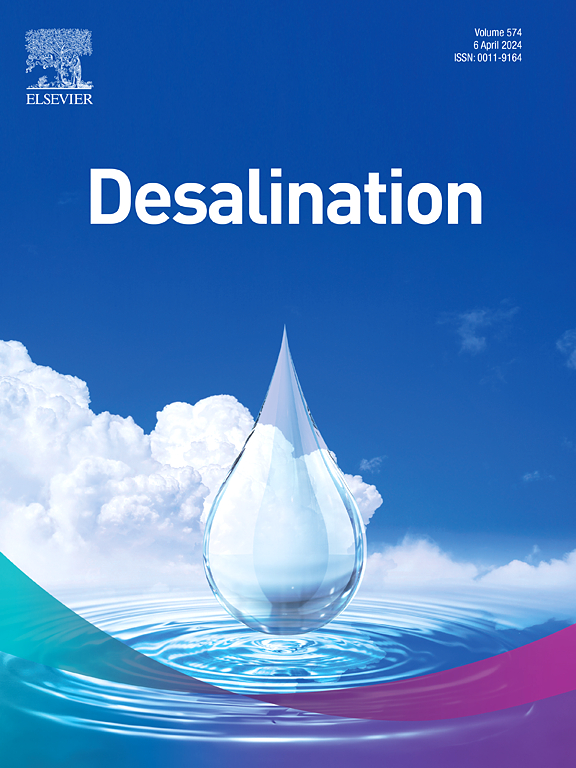通过冷凝水侧加强太阳能蒸馏系统的最新进展
IF 9.8
1区 工程技术
Q1 ENGINEERING, CHEMICAL
引用次数: 0
摘要
太阳能蒸馏作为一种环境友好、易于操作的水处理技术受到了广泛的关注。虽然在优化太阳能蒸馏器结构设计和提高光热转换效率方面进行了大量的研究,但对冷凝过程的改进关注相对较少。冷凝效率低往往导致实际集水率与理论产率或蒸发率之间存在很大差距。我们回顾了目前的策略和机制,以提高冷凝在太阳能蒸馏和分析其在太阳能蒸馏系统的整体性能的关键作用。关键议题包括冷凝的表面设计策略,表面润湿性的优化,微/纳米结构对冷凝效率的影响,以及结构创新和先进冷却技术的集成以增强冷凝。此外,我们还研究了基于蒸馏系统内部传热传质动力学的强化冷凝和蒸发过程之间的平衡。最后,我们建议未来太阳能蒸馏系统的研究重点放在高效被动和主动冷却技术的集成、生物启发的微/纳米结构设计、混合润湿性表面工程、模块化系统架构和人工智能辅助优化上。这些策略旨在提高冷凝效率、系统灵活性和环境适应性,最终实现高性能、智能和可持续的太阳能蒸馏解决方案的开发。本文章由计算机程序翻译,如有差异,请以英文原文为准。
Recent advances on enhancing the solar distillation systems through the condensate-side
Solar distillation has attracted widespread attention as an environmentally friendly and easy-to-operate water treatment technology. While significant research efforts have been devoted to optimizing the structural design of solar stills and improving photothermal conversion efficiency, relatively limited attention has been paid to the enhancement of the condensation process. The low condensation efficiency often results in a substantial gap between the actual water collection rate and the theoretical yield or evaporation rate. We review current strategies and mechanisms for enhancing condensation in solar stills and analyse their critical role in the overall performance of solar distillation systems. Key topics include surface design strategies for condensation, optimization of surface wettability, the impact of micro/nanostructures on condensation efficiency, as well as structural innovations and the integration of advanced cooling technologies to enhance condensation. Furthermore, we examine the balance between enhanced condensation and evaporation processes based on the internal heat and mass transfer dynamics of the distillation system. Finally, we recommend that future research on solar distillation systems focus on the integration of efficient passive and active cooling technologies, bioinspired micro/nanostructured designs, hybrid wettability surface engineering, modular system architectures, and AI-assisted optimization. These strategies aim to enhance condensation efficiency, system flexibility, and environmental adaptability, ultimately enabling the development of high-performance, intelligent, and sustainable solar distillation solutions.
求助全文
通过发布文献求助,成功后即可免费获取论文全文。
去求助
来源期刊

Desalination
工程技术-工程:化工
CiteScore
14.60
自引率
20.20%
发文量
619
审稿时长
41 days
期刊介绍:
Desalination is a scholarly journal that focuses on the field of desalination materials, processes, and associated technologies. It encompasses a wide range of disciplines and aims to publish exceptional papers in this area.
The journal invites submissions that explicitly revolve around water desalting and its applications to various sources such as seawater, groundwater, and wastewater. It particularly encourages research on diverse desalination methods including thermal, membrane, sorption, and hybrid processes.
By providing a platform for innovative studies, Desalination aims to advance the understanding and development of desalination technologies, promoting sustainable solutions for water scarcity challenges.
 求助内容:
求助内容: 应助结果提醒方式:
应助结果提醒方式:


